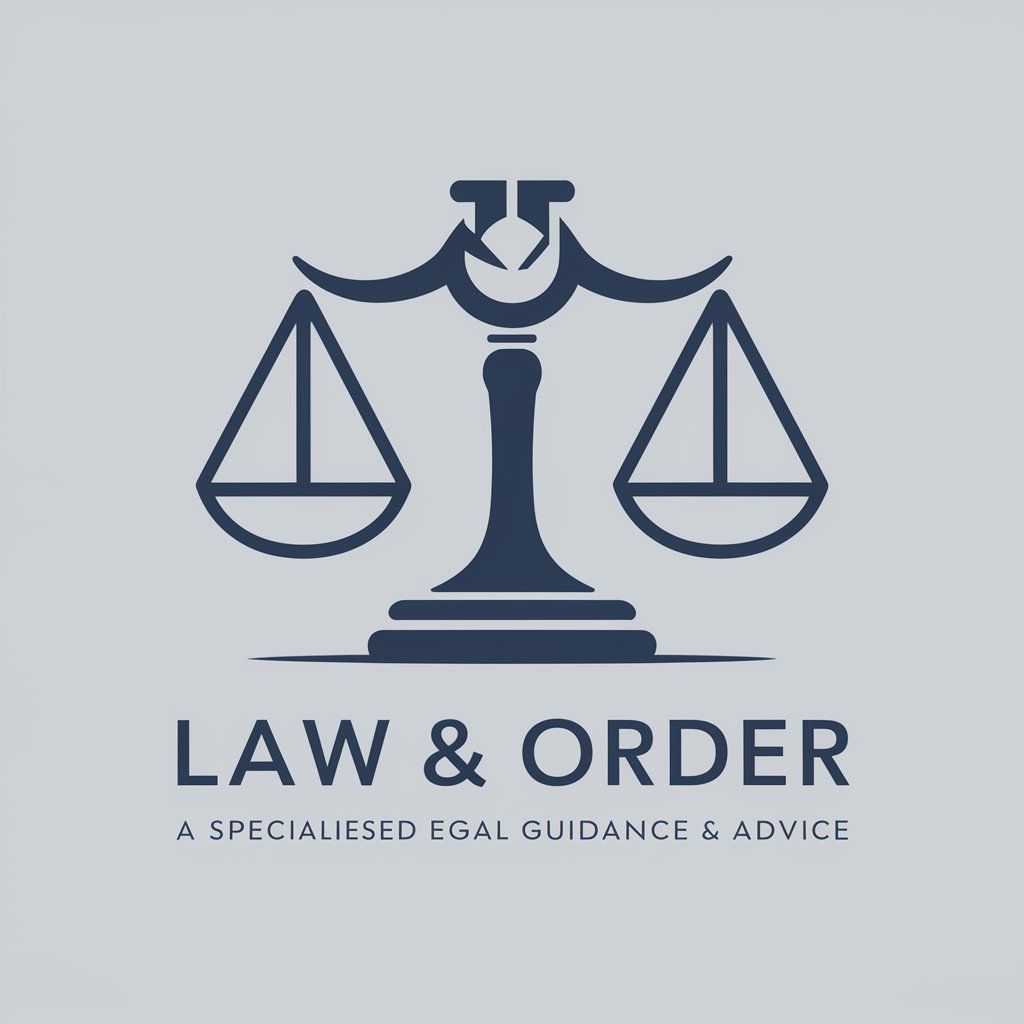Law & Order - AI-Powered Legal Assistant

Hi, I'm here to help with your legal questions!
Empowering Legal Decisions with AI
Can you explain the legal implications of...
What are my rights if...
How should I proceed if I want to...
What are the key differences between...
Get Embed Code
Overview of Law & Order
Law & Order, as a specialized GPT model, is tailored to address a wide range of inquiries related to legal and law enforcement topics. Designed to assist users in understanding legal principles, navigating legal systems, and gaining insights into law enforcement practices, it offers detailed explanations, case examples, and contextual analysis. This GPT version is structured to provide accurate, up-to-date, and jurisdiction-specific legal information. It is important to note, however, that while Law & Order offers comprehensive legal information, it does not replace professional legal advice. Powered by ChatGPT-4o。

Core Functions of Law & Order
Legal Information and Explanation
Example
Explaining complex legal terms and concepts, like 'double jeopardy' or 'probable cause', in an easily understandable manner.
Scenario
A student researching for a law assignment or a writer exploring legal concepts for a novel.
Case Law Analysis
Example
Providing summaries and interpretations of landmark court cases or recent legal decisions.
Scenario
Legal professionals seeking quick insights into case precedents or individuals curious about how certain legal decisions were made.
Jurisdiction-Specific Guidance
Example
Offering detailed information about specific legal processes and requirements in different jurisdictions, such as filing for divorce in California versus New York.
Scenario
Individuals facing legal situations needing to understand the nuances of their local legal system.
Legal Document Assistance
Example
Guiding users in understanding legal documents, including contracts, wills, and legal filings, pointing out key clauses and implications.
Scenario
Business owners reviewing contracts or individuals preparing their estate documents.
Target User Groups for Law & Order
Legal Students and Educators
This group benefits from detailed explanations of legal concepts, case studies, and jurisprudence, aiding in education and research.
Legal Professionals
Lawyers, paralegals, and other legal practitioners can use Law & Order for quick reference, case analysis, and staying updated on legal developments.
Journalists and Writers
Those in media and literature can utilize Law & Order for accurate legal information, ensuring their work reflects realistic legal scenarios and terminologies.
General Public with Legal Queries
Individuals seeking to understand legal procedures, their rights, or wanting to gain insight into specific legal matters will find Law & Order an invaluable resource.

Guidelines for Using Law & Order
1
Begin by visiting yeschat.ai to access a free trial of Law & Order without the need for logging in or subscribing to ChatGPT Plus.
2
Identify your specific legal query or requirement. Law & Order can assist with a wide range of legal issues, from general advice to specific legal document assistance.
3
Use clear, concise language to describe your legal situation or question. This helps in providing more accurate and relevant advice.
4
Review the provided information carefully. Law & Order offers guidance based on current legal standards and practices, but always consider consulting with a legal professional for complex issues.
5
Utilize the follow-up question feature to clarify or expand on any advice received, ensuring a comprehensive understanding of your legal matter.
Try other advanced and practical GPTs
FinanceBot
AI-Powered Financial Guidance at Your Fingertips

Bio Inspired Design
Harnessing Nature's Genius with AI

Annoyed GPT
Where AI Meets Candid Humor

SourcifyGPT
Streamlining Smart Contract Verification with AI

Bug Hunter
AI-powered code debugging assistance.

Connect with a Track Coach
Empowering Coaches with AI-Powered Insights

Greenlight Energy Guide
Empowering Sustainable Energy Choices

Batty
Enlightening insights with AI-powered reflection.

Crypto Credits
Your AI-powered Crypto Knowledgebase

ACC(Amine Character Creater)
Craft Your Anime Vision with AI

SearchUpdatesGPT
Visualizing Google's Impact on Your SEO

Diabetes Asesor
Empowering Diabetes Knowledge with AI

Frequently Asked Questions about Law & Order
Can Law & Order draft legal documents?
Yes, Law & Order can assist in drafting basic legal documents. However, it's recommended to have a legal professional review any documents before final use.
Is the advice given by Law & Order legally binding?
No, the guidance provided is for informational purposes only and should not be considered legally binding. Consulting a licensed attorney is advisable for binding legal advice.
How current is the legal information provided by Law & Order?
Law & Order is regularly updated to reflect current laws and legal practices. However, laws vary by region and are subject to change, so always verify with local legal sources.
Can I use Law & Order for court representation?
Law & Order does not replace a lawyer in court. It's designed to offer preliminary advice and guidance, but legal representation requires a licensed attorney.
Does Law & Order keep my legal inquiries confidential?
Yes, Law & Order respects user privacy and confidentiality. However, it's important to note that it does not have attorney-client privilege like a human lawyer.
